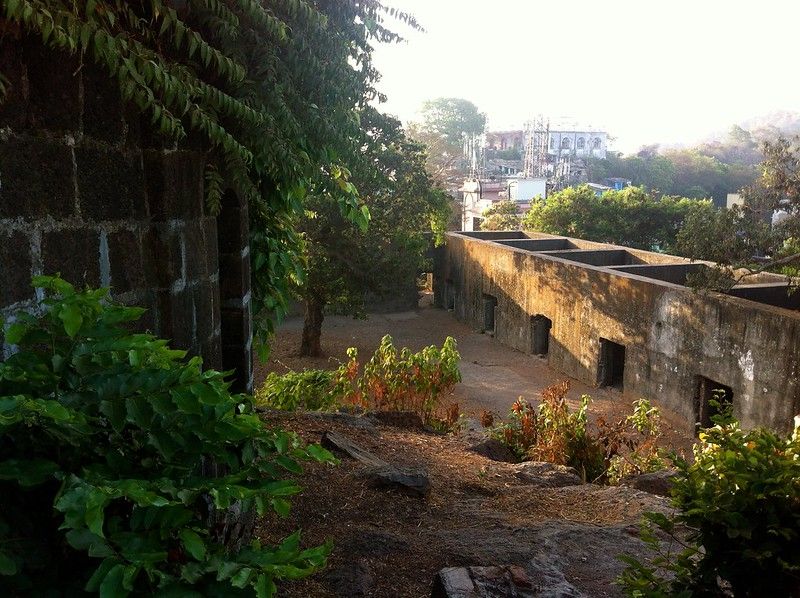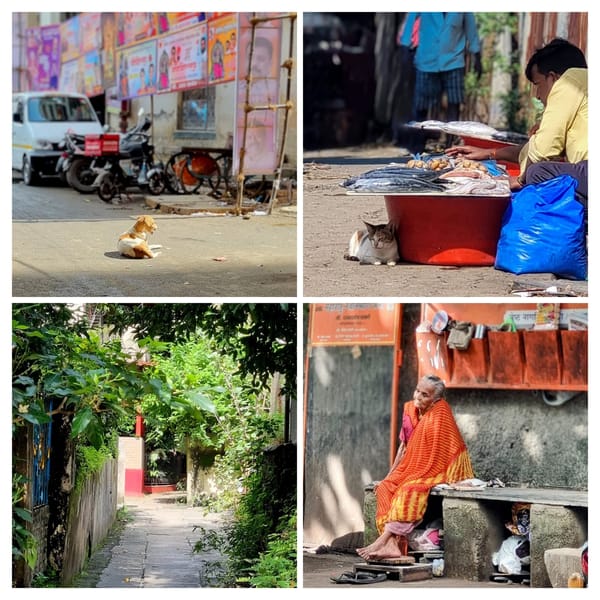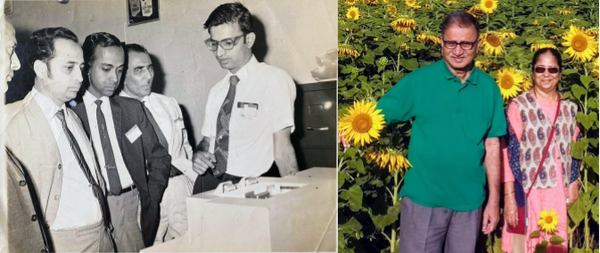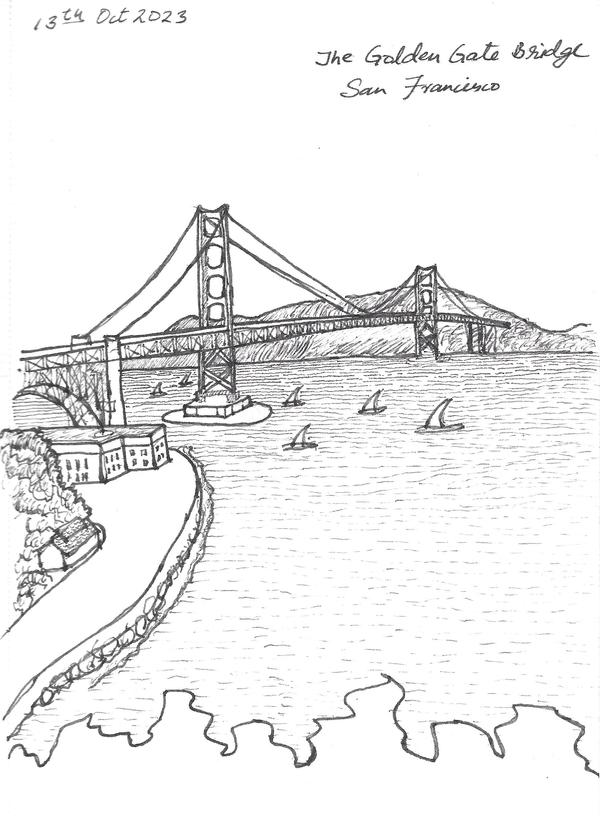Cycling expedition to Ghodbunder Fort, Thane
This was a totally unplanned expedition. Slept late on Saturday night but put an alarm for 5 am by habit. 5 am on Sunday morning, I was wondering where to cycle to that would be a relatively short ride, for it gets really hot after 9 am in May. I thought of visiting another fort somewhere within an hour’s ride from Andheri… that pretty much limits the distance to somewhere in Thane. So I googled “Thane fort” and the first hit was Ghodbunder Fort.
The round trip distance is just over 45 km – which can be easily covered in 2 hours at my normal speed, so I would still get an hour to spend at the fort and still be back before 9 am.
I left home at 5:30 am and rode along the highway till Mira Road, then took the detour towards Ghodbunder village. I reach the fort in just about an hour at 6:30 am. The fort is in the Ghodbunder village, nestled among small village houses along the coast.
 In 1530 the Portuguese came to Thane but they only began building the Ghodbunder fort in 1730. The Portuguese name for the fort was Cacabe de Tanna. The British captured the fort and made it their headquarters of the district administration with a district collector stationed in Thane. It which was under Portuguese rule till 1737 when it was also the site of a Portuguese church. This Church was used as a hotel and is now abandoned.
In 1530 the Portuguese came to Thane but they only began building the Ghodbunder fort in 1730. The Portuguese name for the fort was Cacabe de Tanna. The British captured the fort and made it their headquarters of the district administration with a district collector stationed in Thane. It which was under Portuguese rule till 1737 when it was also the site of a Portuguese church. This Church was used as a hotel and is now abandoned.
 As you enter the fort, you are greeted by a corridor of arches, that lead to one large bastion.
As you enter the fort, you are greeted by a corridor of arches, that lead to one large bastion.
 Behind the arches there is an entrance to a big courtyard
Behind the arches there is an entrance to a big courtyard
 The courtyard has some rectangular rooms, that reminded me of similar construction in Sewri Fort that was also Portuguese
The courtyard has some rectangular rooms, that reminded me of similar construction in Sewri Fort that was also Portuguese
 This is the biggest bastion that lies to the north west corner of the fort. The view from this bastion extends out to the sea on one side and on the other, one can look into the courtyard within the fort walls
This is the biggest bastion that lies to the north west corner of the fort. The view from this bastion extends out to the sea on one side and on the other, one can look into the courtyard within the fort walls
 The view from the bastion extends far and wide and one can see the vasai creek that lies next to the fort in this view
The view from the bastion extends far and wide and one can see the vasai creek that lies next to the fort in this view
 The fort lies at the junction of Ulhas river and Vasai creek. Here you can see the river flowing next to the fort.
The fort lies at the junction of Ulhas river and Vasai creek. Here you can see the river flowing next to the fort.
 There is a huge open space in the center of the fort. No free space in India can escape the inevitable cricket pitch where local kids and adults enjoy the game. Here, one can see practice nets with stones placed as stumps.
There is a huge open space in the center of the fort. No free space in India can escape the inevitable cricket pitch where local kids and adults enjoy the game. Here, one can see practice nets with stones placed as stumps.
 In the center of this ground stands a proud and tall tree. This tree quite likely must have seen the entire history of the fort since it was built.
In the center of this ground stands a proud and tall tree. This tree quite likely must have seen the entire history of the fort since it was built.
 On one side of this ground, almost touching the ramparts to the north, is a huge mango tree. There were ripe mangoes fallen on the ground half eaten by birds. I tried and succeeded in getting one partially ripe mango but it was quite sour.
On one side of this ground, almost touching the ramparts to the north, is a huge mango tree. There were ripe mangoes fallen on the ground half eaten by birds. I tried and succeeded in getting one partially ripe mango but it was quite sour.
 Behind the mango tree, there is a huge fresh water tank. Climbing up on the ramparts one can look over the tank at the arches near the entrance
Behind the mango tree, there is a huge fresh water tank. Climbing up on the ramparts one can look over the tank at the arches near the entrance
 On the way back, I notice some of the arches near the entrace that are overgrown with trees, similar to the Angkor Vat ruins we saw in Cambodia
On the way back, I notice some of the arches near the entrace that are overgrown with trees, similar to the Angkor Vat ruins we saw in Cambodia
 The fort is by and large in ruins. There has been no restoration work in this fort, and wild flowers and trees have overrun the place. This flower is called Mandar or Rui and is a poisonous plant but with certain medicinal uses.
The fort is by and large in ruins. There has been no restoration work in this fort, and wild flowers and trees have overrun the place. This flower is called Mandar or Rui and is a poisonous plant but with certain medicinal uses.
 A last look back into the fort before I head out
A last look back into the fort before I head out
 Outside the fort, the villagers are busy with their daily chores, while a mother hen herds her little ones around, looking for grains and worms for their breakfast
Outside the fort, the villagers are busy with their daily chores, while a mother hen herds her little ones around, looking for grains and worms for their breakfast
 Just behind the fort rampart towards the sea is a private property that is guarded by a gate. Inside the property there is a nice path that leads up to the sea shore. I managed to convince the security guard to let me in
Just behind the fort rampart towards the sea is a private property that is guarded by a gate. Inside the property there is a nice path that leads up to the sea shore. I managed to convince the security guard to let me in
 The path reaches down to the shore of Vasai creek, where a shapely tree clings to the shore and gracefully extends its arms over the water
The path reaches down to the shore of Vasai creek, where a shapely tree clings to the shore and gracefully extends its arms over the water
 From here one can see the boats floating in the gentle waters of Vasai creek
From here one can see the boats floating in the gentle waters of Vasai creek
Finally its time to bid adieu to the place, as it is now almost 7:30 am and time to head back lest I burn in the sun on the way back.




